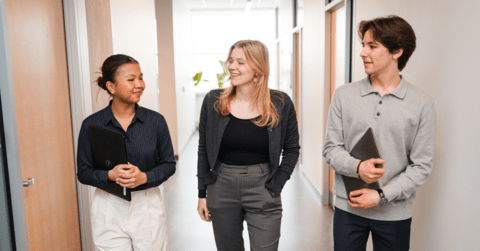Explore your possibilities
The Centre for Career Development can help you build a meaningful future. Whether you are a student (undergrad or graduate), or postdoctoral fellow — we can help you explore opportunities. Our career advisors are available to support you in mapping your career route. If you're seeking career planning advice, career management strategies or graduate and professional school preparation, we can help.
Get career support
It doesn’t matter where you are in your journey, we offer a variety of one-on-one supports both virtually and in person to help you explore your career possibilities.
Ensuring a welcome space for all
We are committed to providing inclusive support and services to all members of the Waterloo community. We believe that everyone deserves equal access to opportunities and resources supporting your career journey and aspirations. For more about equity at the University of Waterloo, visit the Office of Equity, Diversity, Inclusion and Anti-Racism.
Supports and resources
In addition to our one-on-one supports and workshops, the Centre for Career Development offers several other resources to support your career journey. Take the next step in planning your future by visiting CareerHub, your online career resource for things like:
- Building your strategy to find work
- Reflecting on your skills
- Applying and interviewing for jobs
- Making career-related decisions
- Exploring post-graduate programs

Workshops and events
We designed our workshops and events to help you prepare for your future. Whether you need help with résumé writing, interview skills, or something else on your career journey, we have resources to find relevant information to support you.
Here for your career questions
We are here to support you. We offer virtual and in-person appointments to discuss your career journey and goals.
Use our live chat for quick questions and assistance (during operating hours).
Careers in the classroom
Are your students curious about life after university? We have resources that can equip your students with what they need in order to launch their careers. Integrating career education into curricular spaces enables faculty to lead students to identify skills, reflect on how classroom or program-level knowledge benefits their careers and prepares them for the employment process (co-op, work-integrated learning, post-graduation).
Earn while you learn
Co-op is one option through which you can pursue your career path. You can explore jobs, gain valuable work experience and earn money while completing your degree. The Centre for Career Development collaborates closely with Co-operative Education and the Centre for Work-Integrated Learning (WIL) to offer innovative academic courses and career-building programs and materials.
Events
Help! How do I co-op? (Environment)
Getting ready for your first work term this spring? Join this virtual session to discover your options and move forward in your co-op job search. We'll cover:
- Strategies for finding work
- Flexible co-op pathways
- Important dates and deadlines
- Helpful resources to support your job search
Note: This workshop is for Environment student in their first recruitment term.
Résumé tips: thinking like an employer
Feeling confused with your résumé? Let's make it shine. Learn how to interpret job descriptions to identify your strongest and relevant skills to make your résumé more appealing to employers.
Co-op & Career Ready: Résumé Review Drop-Ins
Looking for a co-op job? Come and meet Co-op and Career Advisors who are here to help you move forward in your job search. Bring your résumé for review and receive personalized feedback. Ask your co-op questions and get job search tips – no appointment needed!
News
Exploring pathways to mental health careers
By: Mary Lynne Bartlett (she/her)
Today, many careers in mental health extend beyond counselling offices and clinics. Mental health careers span a wide range of industries and professions.
Service closure
The Centre for Career Development and the Tatham Centre will be closed from 12 p.m. onwards on April 28, 2025 for a staff meeting.
CareerHub maintenance
CareerHub may be down at times over the course of 24 hours, starting at 12 a.m. on February 17, 2025.
